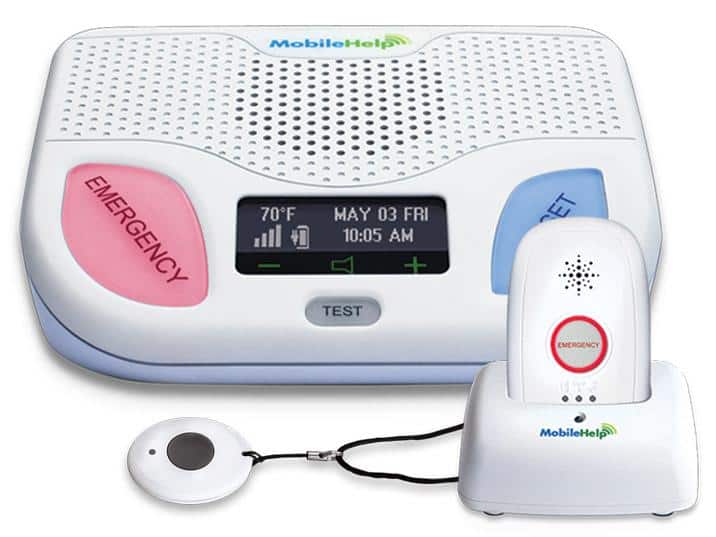MobileHelp vs. Medical Guardian, Hands-On Comparison
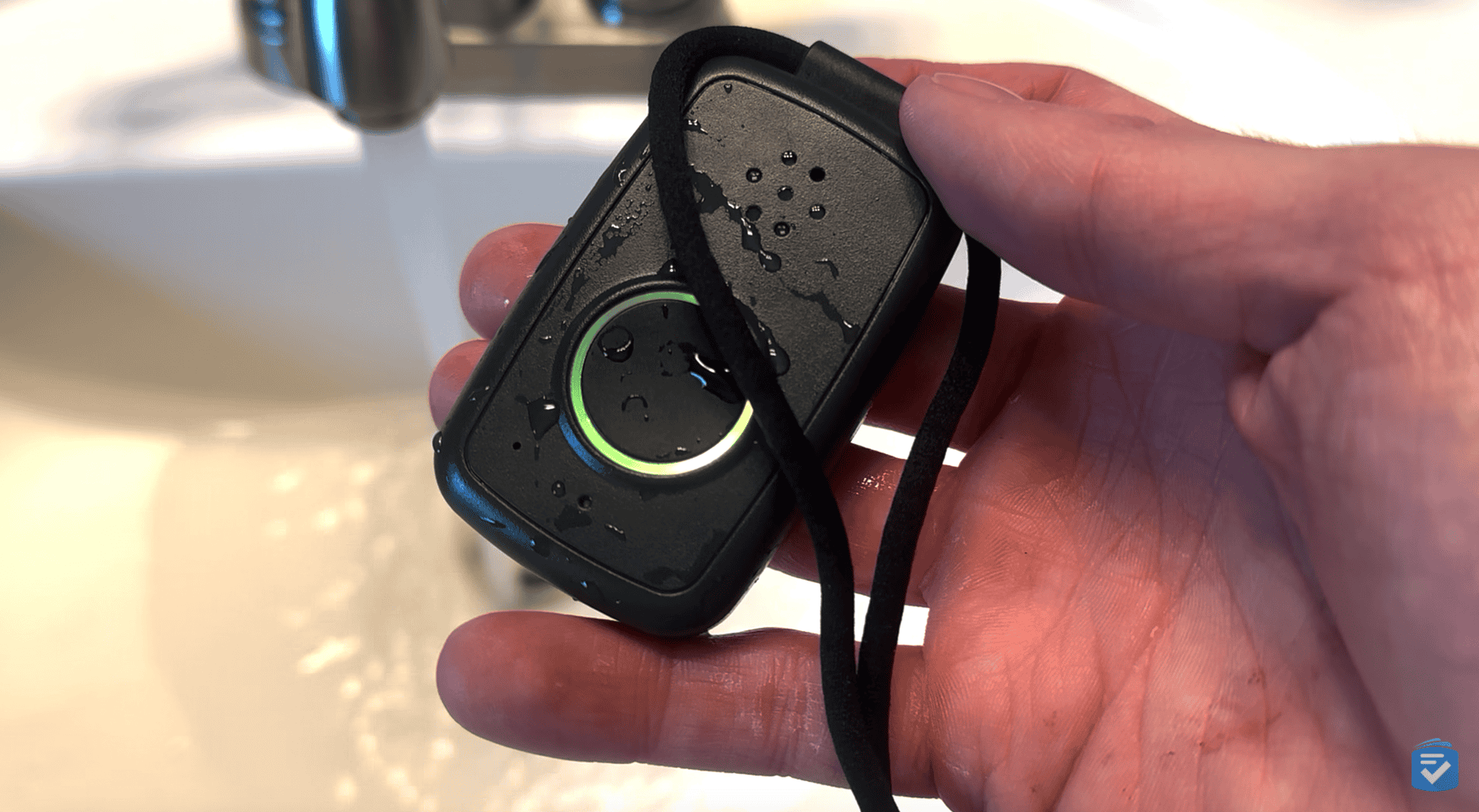
Our hands-on testing reveals a clear distinction between MobileHelp and Medical Guardian. MobileHelp stands out for budget-friendly pricing starting at just $24.95 monthly and with no equipment fees on mobile systems, making them ideal for cost-conscious consumers. However, the company’s slower response times and lack of a caregiver app may be significant drawbacks for families coordinating care and who prioritize rapid emergency responses. Conversely, Medical Guardian impresses with remarkably fast response times (averaging just eight seconds) and comprehensive caregiver monitoring features through their free app. These advantages come with higher monthly fees and equipment costs, however.
According to the Centers for Disease Control’s latest data on fall-related injuries, over one-fourth of Americans 65 and older fall each year, so these response-time differences are potentially crucial. This detailed comparison will help you determine whether MobileHelp’s affordability or Medical Guardian’s superior performance and monitoring capabilities better address your specific safety needs.
Key Findings
- Medical Guardian systems responded to our test calls in an average of eight seconds, while MobileHelp systems did so in 26 seconds.
- MobileHelp’s systems start at $24.95 per month for a cellular system; Medical Guardian’s cellular system costs $38.95 per month.
- Unlike MobileHelp, Medical Guardian offers a free caregiver app.
FYI: Curious how these two companies compare to other top-rated brands? Then read our rundown of this year’s best medical alert systems.
Why Trust TheSeniorList.com?
Our team of caregivers, experts, and health-care professionals conducted over 5,000 hours of in-depth research and testing to recommend the most reliable brands and devices. In this process, our team:
- Tested 50 medical alert devices from 15 different brands.
- Surveyed 1,250 seniors and caregivers on medical alert system usage.
- Consulted with nurses, EMTs, and caregivers who are experts at caring for older adults.
- Published dozens of videos that demonstrate our medical alert system testing.
- Evaluated verified customer reviews of medical alert companies from the Better Business Bureau.
How We Test Medical Alert Systems
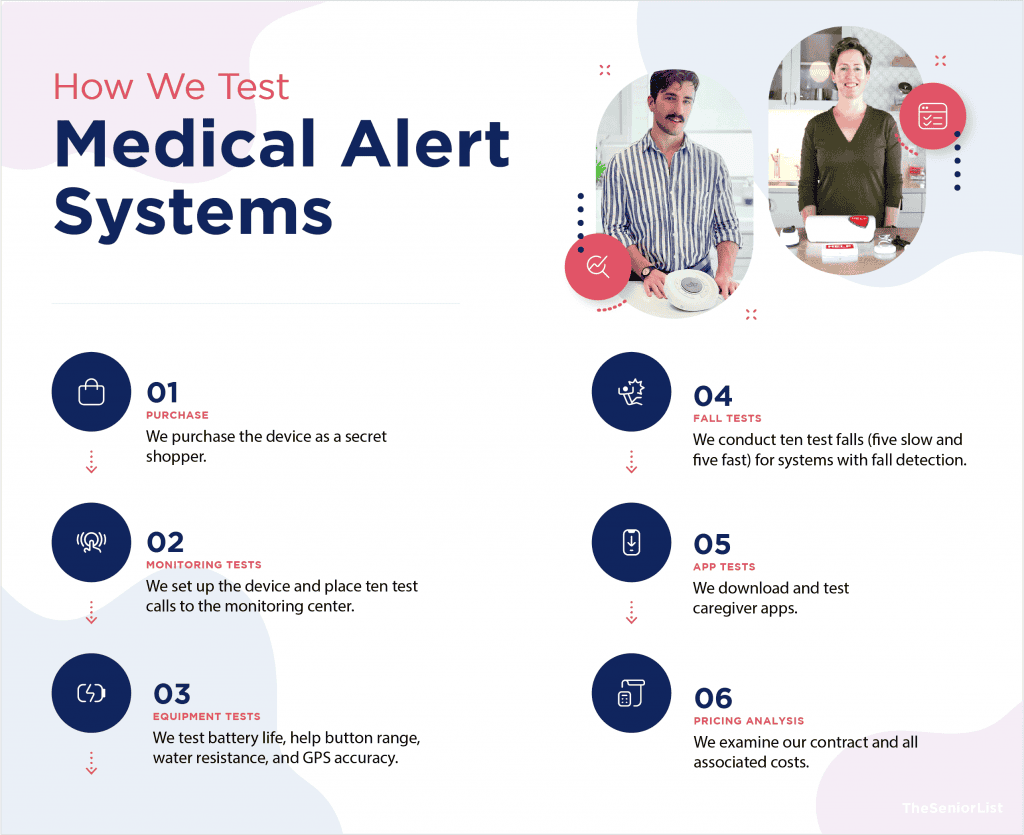
Most medical alert companies sell a variety of systems, including smartwatches and in-home and mobile systems. Each device has its own unique features, but they all offer the same basic function: connecting users to help in an emergency. With this in mind, we evaluate every medical alert system on the following criteria:
- Response times: The faster a medical alert system connects you to help, the better. For each system, we performed 10 test calls, counted how long it took to receive a response, and calculated an average.
- Ease of use: In an emergency, it’s important that a user can successfully activate their system. So, we carefully evaluated each device’s design — with simplicity top of mind.
- Customer care: A human touch is key to caregiving. With this in mind, medical alert companies must offer impeccable customer service — from their agents at monitoring centers to their support personnel.
- Pricing and contracts: We analyze device costs, subscription costs, contract requirements, and other fees associated with a medical alert system purchase.
- Extra features: We test out voice commands, caregiver apps, fall detection, activity monitoring, and any other features included with a medical alert system.
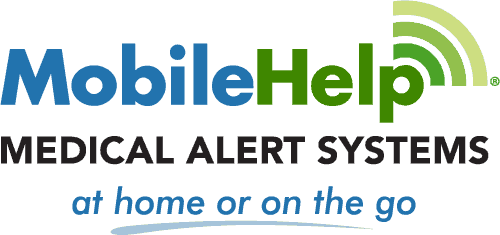
|

|
|
|---|---|---|
| Editor's Ratings | ||
| Starting Price (Home System) |
|
|
| Starting Price (Mobile System) | $34.95 per month | $39.95 per month |
| Minimum Contract Requirement | 1 month | 1 month |
| Average Response Times | 26 seconds | 8 seconds |
| Fall Detection | $5.50-$11 per month (varies by system) | $10 per month |
| Caregiver App | Not available | Included |
| Smartwatch Option | Not available | Yes |
| Contact | ||
| Phone Number |
Call for best price:
800-915-8738 |
Call for best price:
877-947-4512 |
| Website | View Packages Links to MobileHelp | View Packages Links to Medical Guardian |
Medical Guardian Systems Overview
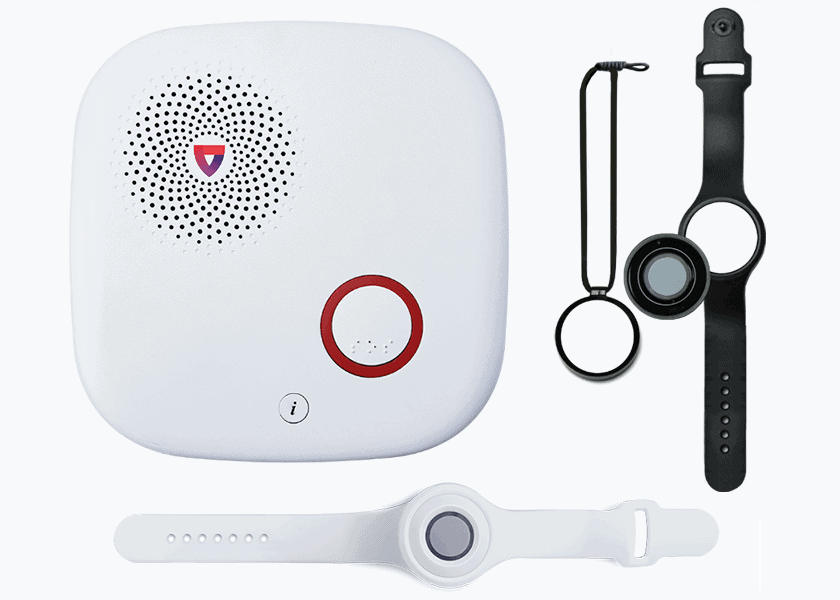
Medical Guardian currently offers five systems. The MGClassic and MGHome Cellular are their landline systems, while the MGMini, MGMini Lite, and MGMove are the mobile systems. Across all systems, we found the Medical Guardian response agents answered our test calls quickly. One study found that every minute without emergency treatment decreases survival chances by 7 percent to 10 percent during cardiac events. Because of this, we appreciate Medical Guardian’s fast response times.
To learn more about our hands-on experience testing these devices, read our full Medical Guardian review.

Medical Guardian Devices Compared
| System | Monthly Starting Cost | For Use | Additional Features |
|---|---|---|---|
| MGClassic | $31.95 | At home |
|
| MGHome Cellular | $38.95 | At home |
|
| MGMini | $39.95 | At home and on the go |
|
| MGMini Lite | $46.95 | At home and on the go |
|
| MGMove | $42.95 | At home and on the go |
|
MobileHelp Systems Overview
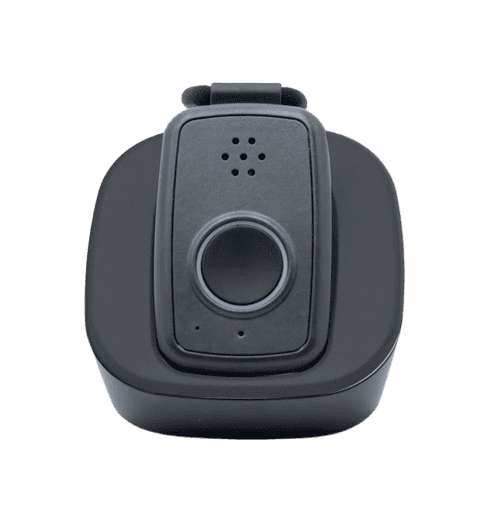
One of the most affordable medical alert providers, MobileHelp currently offers four different systems. The Classic Cellular and Classic Landline are their two home systems, and the Solo and Micro are MobileHelp’s mobile medical alerts.
To learn more about our hands-on experience with these systems, read our in-depth MobileHelp review.
MobileHelp Systems Compared
| MobileHelp System | Monthly Starting Cost | Connection | For Use | Additional Features |
|---|---|---|---|---|
| Classic Cellular | $24.95 | Cellular | At home |
|
| Classic Landline | $24.95 | Landline | At home |
|
| Micro | $34.95 | Cellular | At home and on the go |
|
| Solo | $34.95 | Cellular | At home and on the go |
|
Costs and Contracts
Across the board, MobileHelp costs are significantly lower than Medical Guardian’s. The company’s in-home cellular system costs $24.95 per month, and the in-home landline system costs $24.95 per month. Compare this to Medical Guardian prices, which start at $31.95 for a landline system and $38.95 for an in-home cellular system.
MobileHelp’s mobile systems are also more affordable at $34.95 per month with no equipment charges. Medical Guardian’s mobile systems range from $39.95 to $46.95 per month, and they charge equipment fees of $149.95 to $199.95.
As far as long-term contracts go, neither company requires them. This means you can cancel your service any time and stop making monthly payments, unlike with Life Alert, which imposes binding long-term contracts.

Performance
In our series of 10 test calls with each company, Medical Guardian provided access to help in an average of just eight seconds. MobileHelp systems took considerably longer: an average of 26 seconds. Undoubtedly, Medical Guardian is able to connect users to help in a timelier manner.
We found that the mobile system options from both companies were able to accurately report our GPS location to response agents. Fall detection was also mostly accurate from both companies, with both systems accurately detecting a majority of our test falls. MobileHelp fall detection costs $5.50 to $11 per month, compared to Medical Guardian’s $10 monthly fee.
Extra Features
Where MobileHelp falls short is in the lack of a caregiver app. With Medical Guardian, we could use the MyGuardian app to track a device’s location, receive alerts when an emergency call is placed, and monitor the device’s cellular strength. MobileHelp has yet to offer this type of functionality.
For an extra $2.99 per month, MobileHelp subscribers can send text alerts to loved ones when a system places an emergency call. A similar feature also costs $2.99 from Medical Guardian.
If caregiver features are important to you, then we’d recommend any system from Medical Guardian over those from MobileHelp.
Battery Life and Reliability
When evaluating medical alert systems, battery life is a critical factor with a direct impact on reliability. According to the National Institute on Aging, consistent access to emergency services is essential for successful aging in place. Our testing revealed significant battery life differences between these two providers.
Medical Guardian’s mobile devices offer three to five days of battery life, with the MGMini leading the pack with its impressive five-day battery life. By comparison, MobileHelp’s mobile devices typically last 24 to 36 hours on a single charge. While this is sufficient for daily use, it requires more frequent charging, which could be problematic for users with cognitive impairments or those who may forget to charge their devices regularly.
Both companies provide low-battery notifications through their base stations, but Medical Guardian’s caregiver app adds an additional layer of monitoring protection by alerting family members when the device needs charging. This feature could prove invaluable for remote caregivers concerned about a loved one’s ability to maintain their device.
For optimal reliability, we recommend selecting devices with at least 48 hours of battery life, particularly for users who may have difficulty remembering to charge their devices daily or those who frequently travel away from home.
Customer Service and Support Experience
The quality of customer service can significantly impact the user experience with medical alert systems, especially for seniors who may require additional assistance with setup and troubleshooting.
In our interactions with both companies, Medical Guardian’s customer service team demonstrated exceptional patience and thoroughness, particularly when explaining technical features to first-time users. Their representatives were available 24/7 and maintained an average hold time of less than two minutes during our test calls. The company also offers detailed tutorial videos and a well-organized online help center with printable guides specifically designed for seniors.
MobileHelp’s customer service, while professional and knowledgeable, had slightly longer wait times — averaging five minutes — during peak hours. Their technical support team excelled at troubleshooting connectivity issues, however, and provided clear instructions for system testing and maintenance. MobileHelp offers extended customer service hours from 8 a.m. to 8 p.m. (EDT) but lacks the round-the-clock availability that Medical Guardian provides.
Both companies offer white-glove setup services for an additional fee, which includes personalized installation assistance over the phone. For seniors with limited technical experience or those with cognitive challenges, this service can be invaluable for proper system configuration and testing.
Our Verdict
Both Medical Guardian and MobileHelp have proven experience in the industry, U.S.-based call centers, and a wide variety of pricing and equipment options. Undoubtedly, both companies provide excellent customer service and protection with the option of fall detection.
That being said, MobileHelp offers lower base pricing. If you’re looking for a more budget-friendly option, MobileHelp may be the company for you. Medical Guardian, however, offers quicker response times, and their caregiver app is highly useful.
To learn more about these companies, check out how they ranked in my list of the best medical alert systems.
Frequently Asked Questions
-
How long does it take for each company to respond to emergency calls?
In our hands-on testing, Medical Guardian systems responded in an average of eight seconds, while MobileHelp systems took an average of 26 seconds. While both are within acceptable ranges for an emergency response, Medical Guardian’s significantly faster response time could be crucial in critical situations.
-
Do MobileHelp and Medical Guardian require long-term contracts?
No, neither MobileHelp nor Medical Guardian requires long-term contracts. Both companies offer month-to-month service options that allow you to cancel at any time without penalty. This flexibility is particularly valuable for those needing temporary coverage during recovery periods or who want to test different systems before making a longer commitment.
-
Which company offers better fall detection technology?
Both companies offer comparable fall detection technology for an additional monthly fee. Medical Guardian charges a flat $10 per month for fall detection across all compatible systems, while MobileHelp’s pricing varies from $5.50 to $11 per month, depending on the specific system. In our testing, both companies’ fall detection features accurately detected a majority of our test falls, although neither was 100 percent accurate.
-
Can I use these medical alert systems without a landline?
Yes, both MobileHelp and Medical Guardian offer cellular-based systems that don’t require a landline connection. MobileHelp’s cellular in-home system starts at $24.95 per month, while Medical Guardian’s cellular option starts at $38.95 monthly. These cellular systems use the AT&T or Verizon networks (depending on the provider and package) to connect to emergency services, making them ideal for homes without traditional phone lines.
-
Are these medical alert devices waterproof?
Most wearable help buttons from both companies are waterproof, allowing users to wear them in the shower or bath, where many falls occur. The base stations and mobile devices are typically water-resistant but not fully waterproof. For specific devices, MobileHelp’s wearable pendants and wristbands are waterproof, while their Micro mobile device is water-resistant. Medical Guardian’s wearable help buttons are waterproof, including those that come with their home systems.
-
How do I choose between in-home and mobile medical alert systems?
Your lifestyle should guide your choice between in-home and mobile systems. If you rarely leave home or only do so with a caregiver, an in-home system may be sufficient and more affordable. For active seniors who regularly leave home by themselves, a mobile system with GPS tracking provides protection both at home and away.

